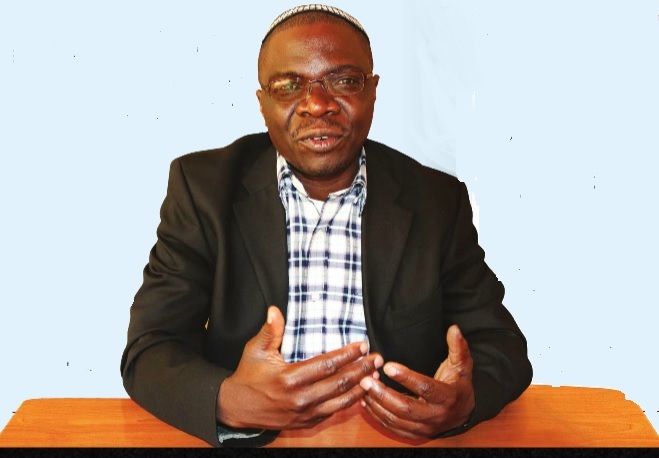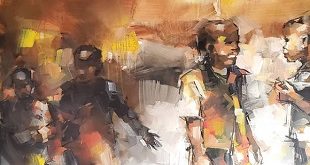
INTERVIEW: Rabbi Gershom Sizomu is the leader of the Jewish community in Uganda the first Jew to win a Parliamentary seat in Uganda’s political history. On February 19, Sizomu who ran on Forum for Democratic Change (FDC) ticket won the Bungokho North parliamentary seat after beating seven candidates, including two from the ruling National Resistance Movement (NRM) party. Sizomu spoke to The Independent’s Agnes E. Nantaba about his experience in the 10th parliament and his plan to popularise Judaism.
QUESTION: It is now over five months since you were sworn in as MP in the 10th Parliament in May. How have you found your new role so far?
It’s a priviledge to be one of those making critical decisions that not only impact on my community but the entire country. I have already raised a question on improvement of agriculture during the debate on the state of nation address where the president promised to get the country to middle income status by 2020. If we are to get there, energies should be focused on irrigation, extending water to villages to boost food production. There are smart people in parliament.
How historical was the moment you learnt that you had become the first Jew to win a seat in Parliament?
It was unbelievable and much as we expected it, the electoral process was not smooth. It was luck on my side to compete with many contenders, notably the two from NRM. If they had presented one candidate, it would have been a harder race. This time round, FDC came out victorious right from the presidency; as Dr Kizza Besigye won, to MP.
Now that you are MP, how do you intend to use your position?
My constituency is composed of mostly non-Jews. We are about 2000 Jews in the country, 15000 of whom are based in my constituency. Our greatest challenge is that people do not have access to clean running water, most places are not connected to the national electricity grid and most people are poor. If there is power and water, people will become more productive.
A plan is already underway targeting over 12,000 villages to have access to clean water by 2017. The president also said that some of the proceeds from oil revenue will be channeled towards irrigation schemes and piped water. Since our problems are common as a country, my role is to push and ensure that we achieve the plans not only for my constituency but for the entire country.
As an accomplished charismatic leader, engaging in active politics literally means having a conflict of interest in roles. How are you working to balance your role of politician and Rabbi?
Conflict of interest would arise if my debate and views in parliament are compromised by being a religious leader. My roles are not in conflict because I serve the people as a religious and political leader. Being an MP only expands the horizon and adds responsibility in the same line of function. A religious leader is a politician. My roles are, therefore, in harmony. My challenge however is balancing time between these two roles. When I am in Kampala, I am lobbying for more services to both Jews and non-Jews. I am supposed to be in my constituency every week and serve my people as a political leader and lead prayers every Saturday.
You represent a bigger constituency of Bungokho North in eastern Uganda but how excited were your close-knit Jewish community when you were announced winner of that seat?
They were very proud. My primary role, howeverm, is not to represent the Jewish community because it is a small one but the greater Bungokho North.
Does it make a difference that the ‘Abayudaya’ have their own representative in Parliament?
The difference might be very small and it is in terms of recognition and publicity for the Jewish community. Even in parliament, I maintain my symbol of Judaism on the head to cause national awareness. The other difference is that should anything rise against the community, I am ready to fight and defend our rights.
As a member of the Equal Opportunities Committee of parliament, I am able to represent my community if there are opportunities.
What message can you give to leaders of other minority groups who yearn for representation of their communities in Parliament?
The aim should not be to represent the minority but interests of all people both majority and minority and once you present yourself as an able candidate, they will win. They should function in light of helping all people despite being a member of the minority because at the end of it all, we have the same problems.
What have you made of the debate in the wider Ugandan public in regards to the MPs’ emoluments, particularly the Shs 200 million car grants and the Shs 68 million for the MPs’ burial arrangements in case of death?
MPs have entitlements like offices, iPads and others that can help then function in their capacities as MPs. The debate should not be about whether MPs are entitled to cars or not but rather how fair that entitlement is. In a country where people are dying of famine, I feel ashamed to take home Shs 200 million for just a car. I even thought of having a fundraising effort to help Ugandans in disaster and how about each MP contributes Shs2 million. We would make a difference in the lives of many Ugandans.
About the Shs68 million, death is a sure deal and when I am gone I don’t enjoy those privileges. Whichever way the funeral is conducted, the fact remains that someone is gone. I owned a four wheel drive even before becoming an MP and it was serving the people. An MP needs a good car.
In 2014, Parliament moved to criminalise homosexuality and your political stance on gay rights was opposed to punishing gays, something which put you at odds with rivals. What issues were left hanging in the debate?
My Bible and religion do not promote homosexuality. The Bible says “man shall not sleep with man as he would with woman”. However, when it comes to criminalisation to the point of killing, as a religious person I am totally against it. We have people in government who have stolen money and they have gone free. Thieves of minor things like chicken are tormented more than those who steal billions of money meant to benefit many people. There is unfairness in people who commit sin. Why should we focus on homosexuality leaving other sinners to go free? Homosexuals should also be handled fairly. A person who steals money for health services will have killed many people yet a homosexual may not. We should not shift focus to homosexuals when we still have thieves of public funds, rapists, and defilers.
How do you intend to fulfill your dream of strengthening African Judaism during your tenure in the tenth parliament?
My agenda for strengthening Judaism started way back even before becoming an MP. I don’t intend to use parliament to strengthen Judaism because there is almost nothing in parliament to help me achieve that. My role is parliament is nationalistic; to serve my people irrespective of religion.
The agenda for development of Judaism takes its own pace and we are steadily growing. We recently completed the construction of our main synagogue and parliament had nothing to do with it. We have an independent programme for the development and growth of Judaism.
Is there anything specific you have set out to achieve during your time in Parliament?
Most of the things that are done in Uganda are not executed by parliament. MPs have a fore and over sight role. Government has an agenda to improve the well being of its people including incomes, health, education, roads and many more. All I want is that while this is going on, members of my community should also benefit to ensure that they share the benefits that government is planning for the larger Uganda. I encourage other MP’s and government to focus on issues that help the larger Uganda and preserve resources for the rest of Ugandans.
I am against corruption because it takes away resources from the national cause and I ask government to be very vigilant to ensure that the meager resources are used for the overall benefit of Ugandans.
****
editor@independent.co.ug
 The Independent Uganda: You get the Truth we Pay the Price
The Independent Uganda: You get the Truth we Pay the Price



